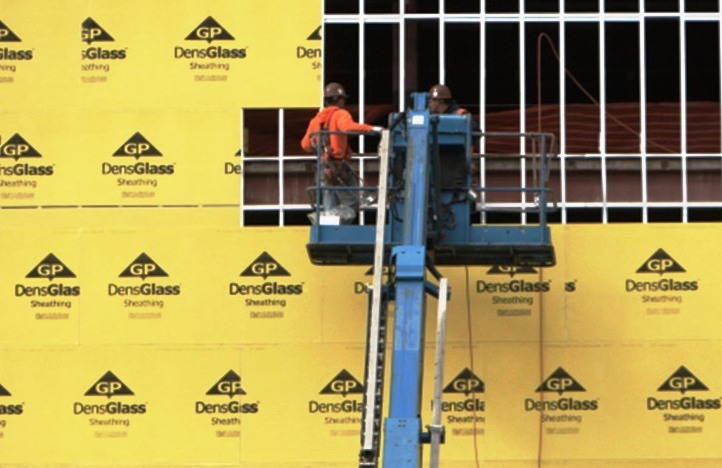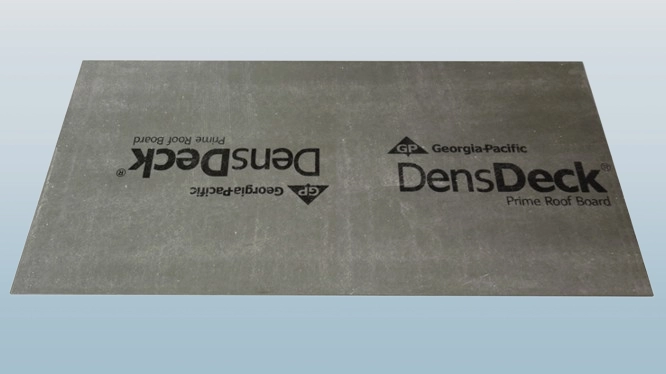DensShield vs. DensGlass

Georgia-Pacific is a well-known business in the building sector. They produce a large variety of high-quality goods for use in both residential and commercial building.
Georgia-Pacific, also known as GP, is your go-to source for sheathing and drywall products. GP’s DensShield and DensGlass products are among its best-selling items.
They both serve different purposes. But they have so many things in common that the typical do-it-yourselfer could get confused. It’s difficult for even some skilled builders to tell DensShield from DensGlass.
Here is a thorough comparison of the two in case you fit into any of the aforementioned categories. You should be able to determine when to use DensGlass or DensShield by the end.
DensShield: What Is It?
DensShield is a backing board for tiles. Those of you who have installed tiles before can attest that it’s a difficult undertaking. You will need to make many attempts at this project before you can complete it successfully.
Even though this process can be difficult, a tile backer board is essential to getting the best results.
It is unnecessary for you to make a thick mortar under the tile if you are using a tile backing board like DensShield. In the past, a layer of mortar underneath was necessary for tile installation.
Sand, cement, and water are frequently used to make mortar. Tile backer boards like DensShield, made possible by technological advancements in construction, have taken the place of mortars in tile installation.
These boards are produced straight from the factory and greatly simplify your work. Tile backer boards like DensShield provide a cleaner and quicker tile installation process than mortars, which are frequently very messy.
There are numerous tile backer board brands available in the market. Among the best known are WonderBoard, DensShield, and HarddieBacker.
As we previously stated, DensShield is a Georgia-Pacific product. It’s a cement-glass mat with 5% filament glass fiber and gypsum mixed in. It is far denser than its rivals. Consequently, that ensures the project’s longevity.
It’s a great tile backer board for high-humidity areas like bathrooms and swimming pools because it’s waterproof as well. If you choose DensShield, a plastic barrier won’t be necessary.
With so many features, DensShield is an excellent option. It resists mold as well. In both residential and commercial properties, mold is a constant threat. If you incorporate DensShield into your project, you won’t need to worry about that.
You’ll be happy to hear that DensShield is the first backer board with an integrated moisture barrier if tile backers have always piqued your interest.
DensShield absorbs less moisture than fiber cement. Because of this feature, it’s ideal for installing tiles in places with high levels of humidity, like bathrooms or pools.
DensShield is applicable to both new construction and home remodeling projects. The typical do-it-yourselfer finds DensShield to be very user-friendly. It cuts similarly to drywall.
As such, the installation procedure will be quite simple. For installation, no specialized equipment is required. This board is also appropriate for locations that don’t receive a lot of moisture.
If you decide against tiling the board, you can always paint it to achieve a more attractive appearance. It’s also critical to understand that DensShield satisfies fire safety regulations.
DensShield is an excellent interior construction product and a product of GP. You can count on strength, resistance to moisture, and a host of other excellent features and attributes with this board. You can rely on it to deliver long-lasting results for your tile installation project.
DensGlass: What Is It?
Sheathing is a common material to see in most construction projects, even if you have never worked in one. The outer layer or casing of a building under construction is called sheathing.
Sheathing serves as both insulation and weather protection for your building when it comes to construction. Sheathing for construction projects is made by numerous brands and is similar to tile backers. Among them is DensGlass from GP.
Very few sheathing brands on the market can compare to DensGlass. Owing to its superior qualities, this sheathing is frequently utilized to provide shelter in regions that encounter severe weather.
It resists water. Therefore if you are building a home or commercial property in an area, that experiences a lot of rainfall and snow.
People use it in areas with typical weather conditions as well, even though it can provide protection for construction buildings situated in weather-prone areas.
This is due to the fact that DensGlass guarantees the highest level of protection. Like almost all of GP’s products, DensGlass resists mold. That is an additional advantage of using DensGlass.
Aside from providing weather protection, using DensGlass as sheathing gives your property’s structure more stability. The surface becomes flatter and smoother after DensGlass is installed, resulting in a sturdy structure that is resistant to buckling or sagging.
The use of DensGlass has an additional benefit. It strengthens the structure’s insulation. Your residential or commercial building will gain from extra insulation when you use DensGlass. That will guarantee that your energy costs are controlled and stay low.
Despite its greatness, DensGlass has one disadvantage that you should be aware of: it is not compatible with forced air heaters.
Homeowners who are considering installing these should be aware of this problem. When forced air heaters are used with DensGlass sheathing, the latter will produce water vapor, which will cause condensation.
In addition, the DensGlass fiberglass mat gypsum sheathing provides additional advantages like stability and insulation in addition to doing a fantastic job shielding your building from the weather.
Moreover, you should be aware that it can serve as a substrate for brick, stone, stucco, and siding.
What Distinguishes Them?
- DensGlass is a sheathing material, whereas DensShield is a tile backer board.
These two products are made by the same company, but they differ in one significant way. DensShield is a backing board for tiles. It serves as an alternative to mortar, which was first applied to encourage tile adherence.
Conversely, DensGlass acts as a sheathing. It serves to shield your building’s structure from inclement weather, such as rain and snow. As a result, these two products deal with two distinct issues.
They are not interchangeable. Choose DensShield if you want a tile backer board, and DensGlass is the best option if you want a high-end sheathing product.
- DensShield is used indoors, while DensGlass is primarily used outdoors.
Looking at DensGlass’s primary uses, you’ll see that it’s primarily employed outside as exterior sheathing. In certain cases, DensGlass can be used indoors in commercial buildings to prevent construction workers from stepping on the floor.
Now let’s talk about DensShield. This product is commonly used indoors as a tile backer board in places like bathrooms and around kitchen sinks. Pool tile backer boards can be made from DensShield.
What Similarities There Are Between Them?
- They are both from GP.
Products under the well-known Georgia-Pacific brand, which produces a broad variety of building materials, include DensShield and DensGlass.
- Both Have Fiberglass in Them
The majority of the materials used in DensShield and DensGlass are the same because they are produced by the same company. For example, fiberglass mats are present in both.
- They can withstand water.
GP ensures that both products are water-resistant in order to guarantee their efficacy. This is very helpful in protecting your building’s structure from water damage.
Additionally, both products resist mold. You can be sure that your tenants won’t suffer from the consequences of mold.
- You Can Paint or Finish Both Surfaces
You can finish or paint over the surfaces, whether you are using Georgia-Pacific sheathing or the tile backer board. This gives you the freedom to fully customize your construction project.
What Makes DensShield Better?
DensShield works incredibly well as a backer board for tiles. When this board is available, installing tiles won’t require you to use the clumsy, antiquated mortar as a layer.
The combination of fiberglass and gypsum gives it sufficient strength to support the tiles in high-humidity areas like the bathroom or pool. It’s also easy to use and resistant to mold.
What Makes DensGlass Better?
Conversely, DensGlass is an excellent sheathing material that will shield your building’s structure from weather-related factors like rain and snow.
It is resistant to mold and water. In addition to providing protection, DensGlass excels at improving insulation and providing a level surface, which increases a building’s stability.
Who and Why Should Use DensShield?
DensShield was developed as a backing board for tiles. This board can help improve adhesion when installing tiles in your home, ensuring they stay put and don’t break or come off for a long time.
DensShield is a great product if you are currently planning to work on a tile installation project.
Who and Why Should Use DensGlass?
DensGlass is useful if you want to shield the structure from the elements while you are building a home or commercial property.
DensGlass will prevent the interior materials from becoming wet because of its water-resistance qualities.

